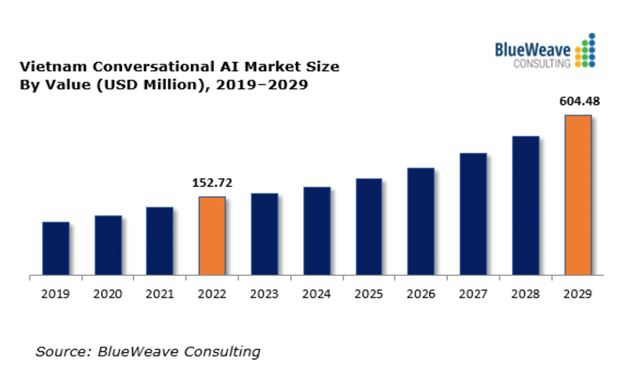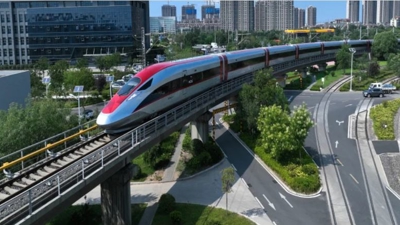AI startup ecosystem to be strengthened
The development of Vietnam’s startup ecosystem creates substantial potential for AI in the country.

Following the success of the “Shaping the Future of Vietnamese AI” initiative in 2024, Google and the National Innovation Center (NIC) officially announced on June 18 a series of initiatives for 2025 to promote AI entrepreneurship in Vietnam. The initiatives focus on strengthening the AI startup ecosystem and promoting digital transformation in the country, including the expansion of strategic cooperation through two new training programs under the Google for Startups ecosystem and the launch of the Vietnamese version of the Google AI Essentials course.
This initiative emphasizes two key pillars: supporting AI startups and popularizing AI knowledge within the community, while contributing to accelerating the digital transformation process in Vietnam.
“The opportunity to develop an AI-led economy in Vietnam is huge, with the potential to bring economic value of nearly $79.3 billion by 2030 - equivalent to 12 per cent of GDP,” said Mr. Marc Woo, Managing Director of Google Vietnam. “Vietnam is not only catching up but also gradually leading the AI trend in the region.”
Land of opportunities
Google chose Vietnam as one of the destinations to support the AI ecosystem for several reasons. According to Mr. Woo, the first is the remarkable entrepreneurial spirit in the country. As of the end of last year, it had around 4,000 startups - a figure that rivals more developed countries.
Microsoft is also actively accelerating Vietnam’s digital transformation, particularly AI adoption across industries such as healthcare, aviation, and banking. It is also expanding inclusive learning opportunities for children, students, and underserved communities. Ms. Nguyen Quynh Tram, Managing Director of Microsoft Vietnam, noted that the country’s AI startup ecosystem has experienced rapid growth, with the number of startups increasing 4.5-fold between 2021 and 2024. These companies are not only scaling but also making significant contributions in sectors like healthcare and the Internet of Things (IoT).
Amazon Web Services (AWS), meanwhile, is empowering businesses in Vietnam with advanced Generative AI (Gen AI) technologies, supporting startups and enterprises at every stage of their AI journey. “Each country is developing its industry at its own pace, and in Vietnam, we are witnessing a vibrant and passionate entrepreneurial spirit,” said Mr. Eric Yeo, Country General Manager at AWS Vietnam.
Many companies are currently exploring the vast potential of Gen AI, striving to apply the technology to boost productivity and improve workflows. Mr. Yeo pointed out that while businesses are at different stages of this journey, they observe one another to accelerate their own progress. “One analogy we like to use is that of swimmers in a pool, each at a different skill level,” he explained. “Some are beginners, testing the waters and practicing in the shallow end. Others are confident enough to swim in the fast lane, and a few bold ones are diving straight into the deep end. This reflects how businesses are approaching digital transformation and deploying Gen AI in Vietnam and the broader region.”
Beyond the startup ecosystem, Vietnamese businesses in general have proactively embraced AI. According to Microsoft Vietnam, one of the most notable strengths this year is the high rate of AI adoption. A significant 82 per cent of business leaders and 71 per cent of employees report familiarity with AI tools - well above the global average.
Similarly, Meta’s analysis shows that the majority of Vietnamese businesses are already using AI to enhance communication and drive customer acquisition, proving that AI is a “must-have” technology, not just “nice-to-have”. The AI for Business: APAC Trends in AI Adoption report from Deloitte revealed that 93 per cent of businesses in Vietnam have adopted at least one AI tool to communicate with and acquire customers.
On the user side, Mr. Woo affirmed that there is growing enthusiasm for AI tools. “That’s amazing, because people are using AI to become more productive and are constantly exploring new technologies,” he said.
Last year, Microsoft’s Work Trend Index also emphasized the widespread use of Gen AI in workplaces. In Vietnam, 88 per cent of knowledge workers were incorporating AI into their job, compared to 75 per cent globally. Among AI users in Vietnam, 93 per cent begin their workday with AI, and 94 per cent use it to prepare for the next day, with both metrics exceeding the global average of 85 per cent among proficient users.
Notably, Vietnam’s young, tech-savvy population is increasingly integrating AI into their daily lives. According to the Factworks and Meta Business Communications Tracking Survey 2023, 73 per cent of Vietnamese consumers are comfortable communicating with businesses through AI chatbots. Vietnamese shoppers also led the world in using AI to discover new ideas and inspiration for holiday shopping, with 15 per cent doing so, according to the Deloitte report.
“With a young, tech-savvy population and one of the highest AI adoption rates in the region, we are seeing strong momentum across both consumer and business use cases,” said Mr. Khoi Le, Country Director of Meta in Vietnam.
Ms. Tram also emphasized that Vietnam benefits from a demographic advantage. “This young, tech-savvy population is well-positioned to drive AI innovation,” she said. “It supports rapid upskilling and experimentation with new technologies, accelerating the country’s AI development.”
Finally, Vietnam has implemented a national AI strategy aimed at positioning the country among the top 4 in ASEAN by 2030. “This strategy includes the creation of legal frameworks for ethical AI development, investment in AI infrastructure, and the launch of talent development programs to build a skilled workforce,” said Ms. Tram.
Mr. Woo shared a similar perspective, saying that the strategy outlines clear steps for national progress in AI. “With the combined efforts of the government, businesses, startups, and users, we truly believe Vietnam has great potential to realize the full value of AI in the coming decades,” he said.
Addressing limitations
AI adoption in Vietnam is, however, limited somewhat by cautious leadership and underdeveloped technology infrastructure. Ms. Tram explained that many business leaders hesitate due to unclear strategies and concerns about business outcomes and return-on-investment (ROI) measurements - despite data showing a return of $3.50 for every $1 invested in AI within 14 months. On the infrastructure side, Vietnam still struggles with fragmented and unstructured data systems, which hinder the effective deployment of AI models. Many businesses lack the integrated, high-quality data necessary for AI to function optimally. Investment in AI-specific infrastructure remains low, and the country has a relatively small pool of AI professionals.
To successfully drive AI adoption, Ms. Tram noted that organizations must first foster a mindset shift among leadership, embracing innovation and long-term thinking. Adopting a “think big, start small” approach enables manageable pilot projects that can be rapidly scaled once proven effective. Equally crucial is investing in training programs that build AI literacy and practical skills across the board. A particularly effective strategy is to cultivate “AI champions” - early adopters in every department. By leading by example, they play a key role in spreading AI adoption across teams.
For instance, Prudential Vietnam could achieve successful internal AI adoption by appointing champions in departments like Marketing, Finance, and Human Resources (HR). Collaboration with reputable technology partners further accelerates learning and implementation, while ensuring robust data security. Fostering a culture of continuous innovation will sustain and evolve AI initiatives over time.
Similarly, a concern among small and medium-sized enterprises (SMEs) recorded by AWS is that implementing AI can be challenging, as they often lack the time and resources to experiment with and adopt the technology. This can slow innovation and limit growth opportunities.
According to Mr. Yeo, the key to overcoming this challenge lies in investing in AI skills training and expanding access to technology for all businesses. In particular, employers play a vital role in encouraging employees to learn and adopt new skills, preparing them for an AI-driven workplace. In terms of providing access to technology, Gen AI tools are already available today that can be easily integrated into company operations.
On the other hand, Mr. Woo believes AI is becoming nearly ubiquitous and can benefit all industries. For startups to truly capitalize on this opportunity, the first principle is to never stop learning. Next, always think about the problems at hand and how AI can be used to solve them. Finally, businesses should embrace the wide range of technologies and solutions that companies like Google bring to a market like Vietnam.
Government efforts
With the goal of turning AI into a key technology field in Vietnam, in January 2021, the Prime Minister issued the National Strategy on the Research, Development, and Application of AI to 2030, which aims to make Vietnam a center for innovation and the development of AI solutions and applications in the ASEAN region by 2030.
After three years of implementation, Vietnam had achieved initial results, rising to 59th out of 193 countries and fifth out of the ten ASEAN countries in the Government AI Readiness Index from Oxford Insights in 2023.
One of the most significant efforts highlighted by Ms. Tram is the Vietnam AI Economy Report 2025, which outlines a strategic roadmap for AI development, emphasizing three pillars: expanding AI adoption across sectors, supporting startups, and building a strong AI talent pool. The report also stressed the importance of structured partnerships with global research labs and corporations to expose Vietnamese talent to cutting-edge AI challenges.
In parallel, the government has launched a HR development program aiming to train 7,000 AI experts and support 500 AI startups by 2030. This is part of a broader strategy to integrate AI across sectors and build a comprehensive AI training and research ecosystem.
“The Vietnamese Government has shown growing support for AI development, particularly through initiatives that foster collaboration between businesses, researchers, and policymakers,” Ms. Tram said. “Ideally, optimal government support would strike a good balance between policymaking and action-oriented initiatives, with a clear focus on enabling collaboration, building infrastructure, and nurturing talent to position Vietnam as a regional AI leader.”
To attract AI development from global corporations, Mr. Yeo recommended that Vietnam invest in digital skills development at both the workforce and leadership levels. Preparing employees to operate confidently in an AI-driven world, especially with emerging technologies like Gen AI, sends a strong signal to global companies that Vietnam is ready to embrace and scale advanced technologies.
“By fostering a culture of continuous learning and digital readiness across both the public and private sectors, Vietnam can position itself as a strategic partner for global technology companies looking to invest in AI development,” he noted.

“This is a defining year for AI in Vietnam. At Meta, we believe that AI will unlock transformative opportunities for people, businesses, and the economy, and Vietnam is uniquely positioned to lead the way.”
Mr. Khoi Le, Country Director of Meta in Vietnam
“At Google, we believe in the potential and the strategic importance of the country, especially when it comes to the digital economy and the potential of AI.”
Mr. Marc Woo, Managing Director of Google Vietnam
“Vietnam holds several strategic advantages in developing its AI industry compared to other countries in the region. These strengths are reflected in our findings from Microsoft’s Work Trend Index in recent years, which have highlighted Vietnam’s proactive stance in embracing AI technologies.”
Ms. Nguyen Quynh Tram, Managing Director of Microsoft Vietnam
“Vietnam has a strong sense of entrepreneurship. The people and businesses I work with are eager to learn, adopt new technologies, and improve the customer experience, all of which are essential foundations for successful AI adoption.”
Mr. Eric Yeo, Country General Manager of Amazon Web Services Vietnam







